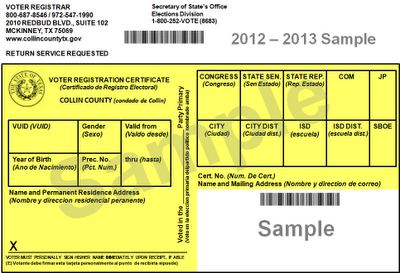AARP: Many older Americans will not be allowed to vote this year.
by Marsha Mercer
The midwife at the 1949 home birth in rural South Carolina delivered a healthy baby girl but didn't file a birth certificate. Donna Jean Suggs grew up, got a Social Security card and found work as a home health aide. Try as she might, though, she couldn't get a birth certificate. That meant she couldn't get a driver's license or register to vote.
"I fought with them and fought with them," she said of the local and state officials. "I prayed and prayed." In time, said Suggs, 62, who lives in Sumter, S.C., "I gave up on things" — like voting.
Having a driver's license or photo identification card is commonplace for most Americans, but about 11 percent of adult citizens — more than 21 million people — lack a valid, government-issued photo ID, according to a study by the Brennan Center for Justice at the New York University School of Law.
Increasingly, this puts their right to vote at risk. A year ago, only Georgia and Indiana required photo ID cards to vote. Since then, 34 states have introduced voter ID laws. Five enacted them, governors in five other states vetoed them, and other states are considering them.
"What's new is the no-photo-no-vote" laws, said Jennie Bowser, a senior fellow specializing in elections at the Denver-based National Conference of State Legislatures. "The 2010 elections' big shift toward Republican control of state legislatures was certainly a piece of that."
Older voters most affected
The trend alarms voting advocates like Lawrence Norden, acting director of the Brennan Center's Democracy Program, who said photo ID laws hit older people, the poor, African Americans and students the hardest. "This is the first time in decades that we have seen a reversal in what has been a steady expansion of voting rights in the United States," Norden said. "There's no question that citizens over 65 will be particularly impacted. The older you get, the more likely you won't have an ID."
Nearly one in five citizens over 65 — about 8 million — lacks a current, government-issued photo ID, a 2006 Brennan Center study found. Most people prove their eligibility to vote with a driver's license, but people over 65 often give up their license and don't replace it with the state-issued ID that some states offer non-driving residents. People over 65 also are more likely to lack birth certificates because they were born before recording births was standard procedure.
Strict new photo ID laws could make voting this year more difficult for 3.2 million voters in Kansas, South Carolina, Tennessee, Texas and Wisconsin, if the new laws stand, according to the Brennan Center.

